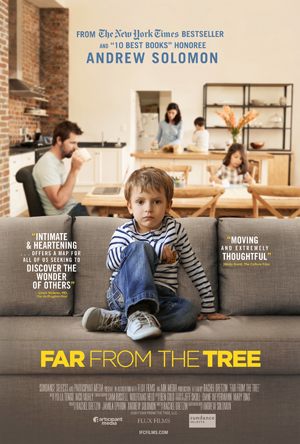By Terry McCarthy
Warning: Film Spoilers Ahead
The film Far From The Tree, based on the book of the same name by Andrew Solomon, is a powerful and moving lesson in human empathy, showing the resilience and love in five families with children born with some disability in the face of a society that routinely turns its back on humans who are “different”.
The mother of Jason, who has Down syndrome, says that when she and her husband realized their son’s condition, “it was like letting go of a dream.” And yet they doubled down on the attention and love they gave to Jason, helping him to learn, read and get a job. He now lives in a house with two other disabled men, who call themselves ‘The Three Musketeers’, and tells his mom that if there were some miraculous cure to take away his Down syndrome he would “no longer be me.”
A man and a woman who are born with dwarfism – they call themselves “little people” – get married and get pregnant. Will their child also be a “little person” or of average height? Outsiders might think they would hope for a “normal” child, but of course normal looks very different to people who are just three feet high. Their parents seem happy to hear the news of the pregnancy, withholding judgment.
Most moving was the story of Jack, an autistic boy who became unresponsive around age two, started becoming violent and aggressive as he grew up and never learned to speak. But his parents persevered with a range of treatments and therapies, finally coming to a therapist who shows their son words which he can identify by pointing at them (“hot” for sun etc). The parents didn’t even know their son could read. Then the therapist gives him a pointer and an alphabet chart, and he spells out the sentence “I am trying and I am really smart.” The mother, sitting in the corner of the therapy room as this happened, is dumbfounded, “It was like I was meeting him for the first time.” (This sequence activated a lot of tear ducts in the movie theater.) Later, when Jack is asked how it feels not being able to speak, he taps out “The feeling is like a tiger in a cage.”
In the Q&A after the screening, Andrew Solomon said “the point was to find people who had discovered resilience and found ways to have meaningful relationships with kids who are different.” Solomon himself appears in the film, talking about how he struggled with coming out as gay, which his mother refused to accept. Today, thirty years later, he sees the LGBTQ community as being much more readily accepted, which leads him to reflect on whether other so-called “defects” might also experience a change in how people view them. Is being different from the mainstream always something that requires correcting? The question, he says, “is how to decide what to cure and what to celebrate?” We often find ourselves with a “troubling dichotomy”, he says, in which we celebrate diversity in our society and yet we don’t want people who seem to struggle with their differences or whom we find hard to accept in their differences.
The film was made by Rachel Dretzin, who spent many hours getting to know her subjects before bringing in her cameras – “it took a long while,” she says. The result is a very engaging journey into the lives of some very engaging – if different – human beings, and a gentle advocacy for the acceptance of these differences.

